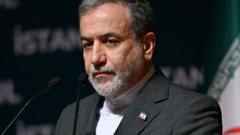In an unexpected move, President Trump has signed an executive order to lift many economic sanctions on Syria, a decision welcomed by the war-torn nation's citizens. This change occurs as U.S. officials outline expectations for the new government led by President Ahmed al-Shara, following a long civil conflict.
U.S. Eases Sanctions on Syria: A New Chapter?

U.S. Eases Sanctions on Syria: A New Chapter?
President Trump's recent executive order to lift sanctions on Syria signals a potential shift in U.S.-Syria relations and raises questions about future governance.
After a coalition of rebels ousted the long-standing dictator Bashar al-Assad, the previous U.S. administration had largely overlooked Syria. However, this dynamic shifted dramatically when President Trump announced during his May visit to Saudi Arabia that the U.S. would be suspending many economic sanctions to provide the country with an opportunity for recovery and growth. The announcement was met with enthusiasm in Syria, where over 90% of the population is currently living in poverty, according to United Nations statistics.
On July 1, 2025, Trump formally signed an executive order ending considerable sanctions against Syria. While certain measures still require congressional approval for repeal, the lifting of most sanctions is a substantial indication that other nations and financial institutions could cautiously resume business with Syria without fear of U.S. consequences. This action serves as a crucial lifeline for Damascus’s new leadership, despite growing apprehensions about the Islamist president's future governance approach.
Despite the warmer relations, the Trump administration has signaled a reluctance to intervene in Syria's internal politics, focusing instead on regional stability goals. Over recent months, U.S. officials have articulated expectations regarding Syria's management of security and diplomatic relationships with neighboring countries—not as rigid conditions, but as broader aspirations for President Ahmed al-Shara, who is now at the helm following the ousting of the authoritarian Assad regime.
On July 1, 2025, Trump formally signed an executive order ending considerable sanctions against Syria. While certain measures still require congressional approval for repeal, the lifting of most sanctions is a substantial indication that other nations and financial institutions could cautiously resume business with Syria without fear of U.S. consequences. This action serves as a crucial lifeline for Damascus’s new leadership, despite growing apprehensions about the Islamist president's future governance approach.
Despite the warmer relations, the Trump administration has signaled a reluctance to intervene in Syria's internal politics, focusing instead on regional stability goals. Over recent months, U.S. officials have articulated expectations regarding Syria's management of security and diplomatic relationships with neighboring countries—not as rigid conditions, but as broader aspirations for President Ahmed al-Shara, who is now at the helm following the ousting of the authoritarian Assad regime.




















